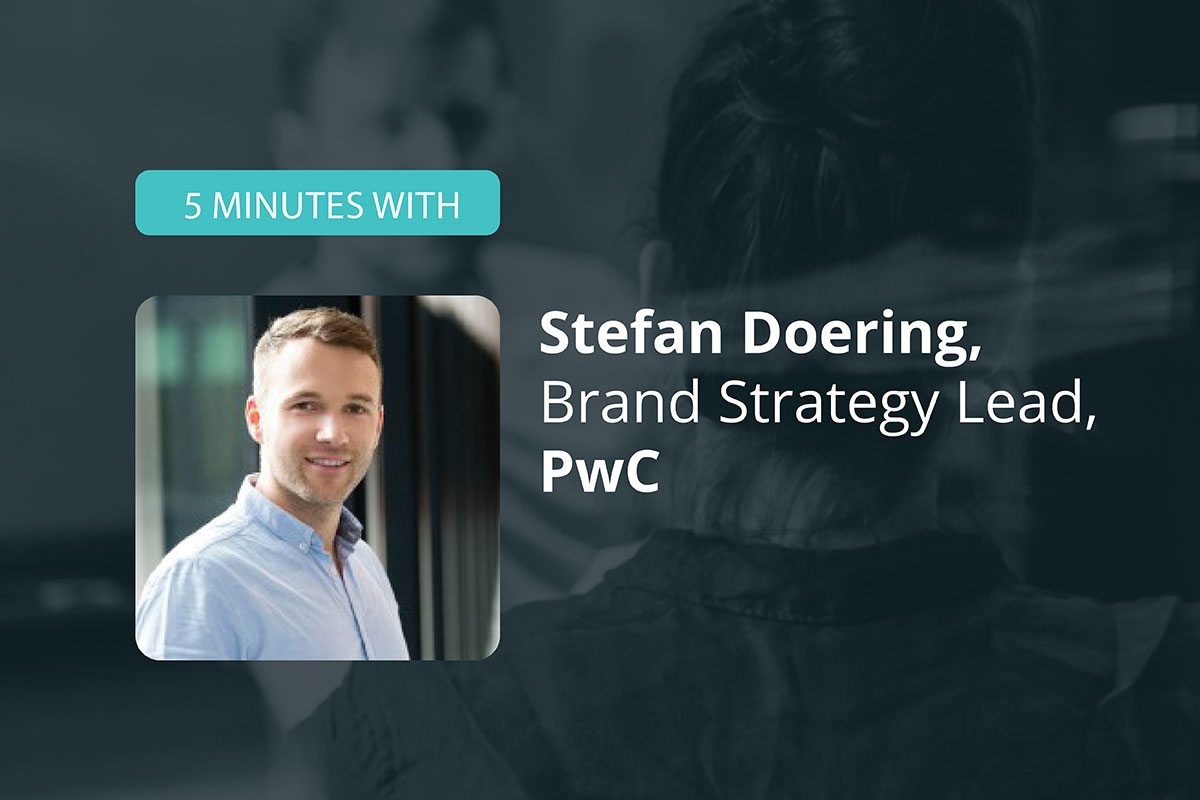This month I’m delighted to be speaking to Stefan Doering, Brand Strategy Lead at leading professional services firm PwC. During his career Stefan has led some of the UK’s most high-profile brand advertising campaigns and developed engaging, relevant and effective brand platforms.
Here’s my 5 minutes with…
What is your marketing background?
As long as I can remember, I’ve always had a deep interest and passion for marketing – for me, it’s inherently a very human-centred discipline, working to change people’s perceptions or behaviours and elicit some sort of action or response to the work you’ve created. I studied modern languages at Durham University, which certainly gave me some fantastic insight and understanding into the way people communicate with each other and the world at large, as well as being very conscious of cultural nuances.
I started my career on the graduate scheme at M&S, working my way up from a Marketing Planner role to Brand Marketing Manager in the Campaigns team, working on some fantastic campaigns including flagship Autumn/Winter fashion campaigns, and of course well-loved and iconic Christmas campaigns, such as ‘Mrs. Claus’. I then took the opportunity to join the brand team at Sky Mobile, as they were just entering into the mobile phone market, which was another brilliant experience to launch a completely new and exciting challenger-brand in the UK, with all the power of Sky behind you. And most recently, I joined the fantastic Sales & Marketing team at PwC to lead on our brand strategy for the UK.
What does your role at PwC involve?
As Brand Strategy Lead for PwC in the UK my role involves protecting, growing and amplifying the PwC brand – both at a masterbrand level, as well as through all our various marketing campaigns, communications and activations.
I work together with my colleagues across our UK business and our Global Brand Team to define and develop brand positioning, messaging, creative and brand standards for new products and service offerings across our organisation, ensuring that we consistently bring our brand to life in the best possible way.
As you mention you’ve held brand strategy roles for many leading organisations, including PwC, Sky Mobile and M&S, what is your definition of a “brand’?
Quite simply, it’s what you stand for in the hearts and minds of your clients and people.
Quite simply, it’s what you stand for in the hearts and minds of your clients and people.
A lot of the time, I find that brands and organisations can tend to quickly overcomplicate their brand thinking, with lots of different frameworks, theories or architectures – but ultimately what it all distills down into is what you stand for. It’s the first thing that comes to mind when people think about you, and how you make them feel.
Throughout your career what have been some of the biggest challenges you’ve faced in brand marketing and how have you overcome them?
I’m a big believer that challenges are great opportunities for innovation or to do things differently. Throughout my career there have been many challenges, often business challenges that as marketers we are asked to help solve, which is what I find so exciting about a career in marketing.
In my experience, I feel there are two big common challenges in brand marketing:
First, I find that a lot of the time you really have to prove your business case to invest in brand, when sometimes short-term sales activation can seem more attractive to deliver more immediate ROI. The truth is you need a balance between brand and activation, as is well documented by the brilliant advertising effectiveness research by Binet and Field.
The second, is the challenge of being true to a brilliant creative idea, and holding that creative flame right through from concept to final execution. Throughout our industry there are so many exciting, innovative and interesting ideas, which sadly never see the light of day, because as they go through the inevitable multiple rounds of stakeholder amends and revisions, they either get severely diluted or completely changed – and sadly often not for the better. So getting all your stakeholders bought into the vision is absolutely critical!
In a recent presentation you gave at a B2B marketing conference, you discussed the importance of moving from B2B towards B2Human, why for you is this so important?
Just because people are working in professional organisations or senior roles within business, doesn’t suddenly turn them into ‘corporate machines’.
In short, because our clients are human too. Just because people are working in professional organisations or senior roles within business, doesn’t suddenly turn them into ‘corporate machines’. They are multi-faceted, diverse individuals with their own opinions, priorities, ambitions and concerns – and in B2B it’s so important that we communicate and treat our clients and prospects as such. I’m a big advocate of brand building and driving long term memory associations of your brand through more emotional responses – how does it make your audience feel and think about you? That’s why it’s so important to connect at a human level.
You’re a big advocate of telling human and engaging stories, for me this is something many professional services firms fall short on, how easy was it to bring this mindset change at PwC?
Everything we do as an organisation is guided by our purpose and values – to build trust in society and solve important problems – which is an incredible platform to tell some fantastic human and engaging stories of our business, our people and the work we do. Over the last few years we’ve undergone a massive transformation in our marketing, brand and communications teams at PwC, so we’ve already been well on our way on this journey of being able to tell our stories in this way and demonstrate the impact we have across society. And ultimately those are the stories that are the most powerful and really make a difference to our clients, our people and the world we live in.
Thought leadership is central to so much that we all do in professional services marketing, what does true thought leadership mean to you and what are the fundamentals to a successful campaign?
Thought leadership needs to be actionable in the real world, and make a valuable, positive contribution to organisations and society at large.
For me, thought leadership needs to be actionable in the real world, and make a valuable, positive contribution to organisations and society at large. I absolutely love exploring big ideas, groundbreaking concepts and the art of the possible, but ultimately I feel thought leadership has to lead to tangible outcomes, and be able to be practical and workable to be a success and actually make a difference to the world.
If you were told you could only report on 3 key metrics, what would they be?
Brand Awareness, Consideration and Conversion.
How have you successfully managed the global versus local brand relationship at PwC?
Collaboration, collaboration and more collaboration. Given the nature of being a network firm, it’s absolutely critical that we are connected closely into our global teams, and our different colleagues across all the territories we work in. Having such a massive global footprint and reach is one of our greatest strengths, so it’s really important that we maintain a consistent experience for our clients and people across the world – and brand has a huge part to play in that.
Finally, what’s the best piece of marketing advice you’ve ever been given?
Don’t let anyone tell you that something is ‘impossible’….

